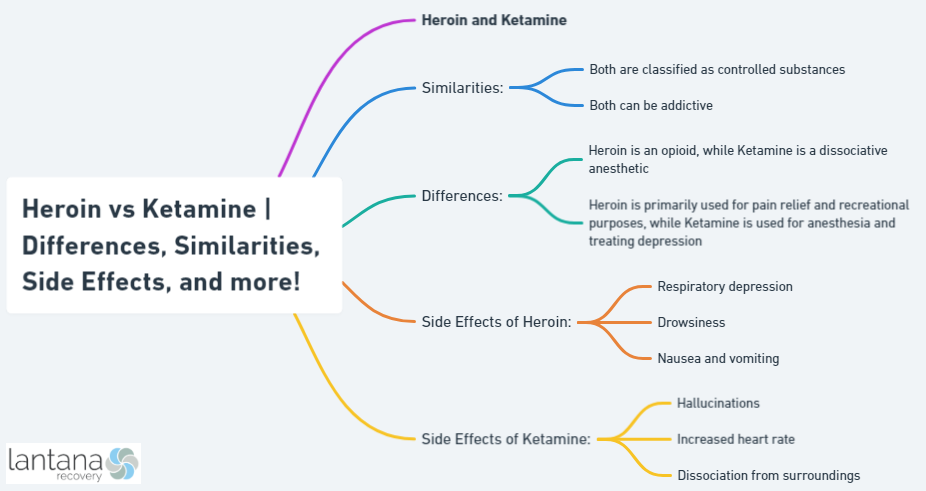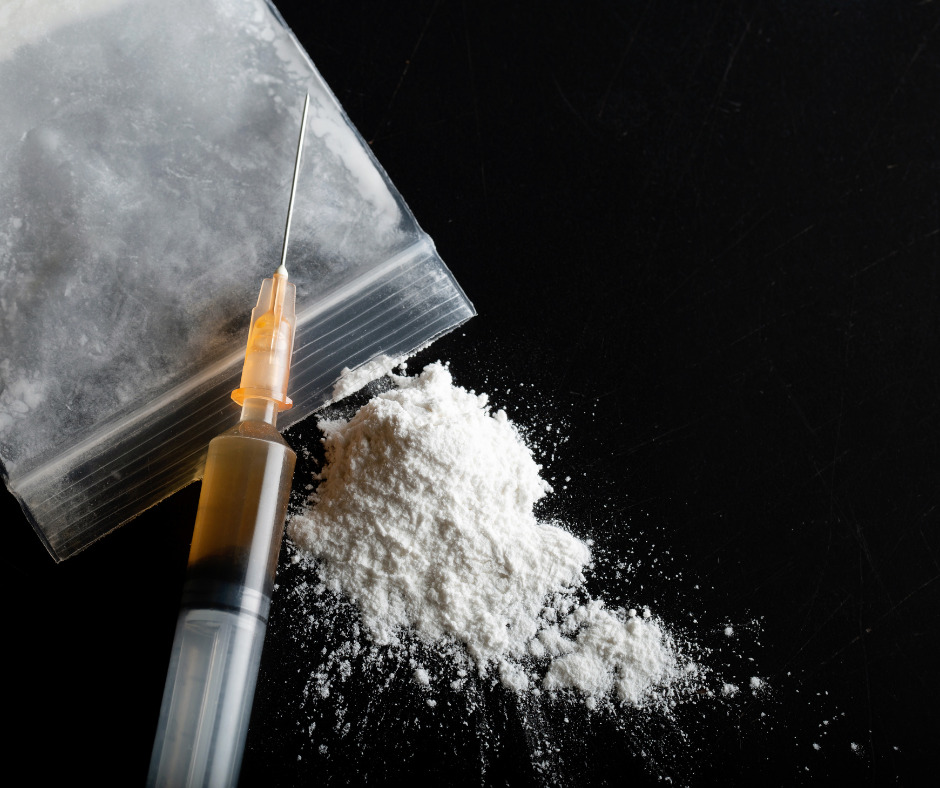Heroin and ketamine have a long history of being used as medications and recreational drugs, but what is the difference between them? The answer lies in their unique chemical structures and varying effects on the body.
While heroin has been associated with extreme physical dependence, ketamine offers a variety of health benefits without the same risks. In this blog post, we’ll dive deeper into their differences, similarities, side effects, and clinical uses to give you a better understanding of each drug.
Whether you’re considering using these substances recreationally or medically – read on for an all-encompassing look at both heroin and ketamine!
What is Heroin?
Heroin is an illegal drug derived from Morphine, a naturally occurring substance taken from the seed pod of certain varieties of poppy plants. It is typically sold as a white powder and can be snorted, smoked, or injected and users describe a “rush” feeling when they take it. Unfortunately, this high is short-lived and can result in physical dependency with regular use; often leaving users at an extreme disadvantage.
Chemical Composition of Heroin
The primary active ingredient in heroin is morphine, which is responsible for its powerful pain-relieving and euphoric effects. The chemical formula of Morphine is C17H19NO3.
What is Ketamine?
Ketamine is an anesthetic drug that has been used for medical purposes since the 1960s. It works by blocking certain communication pathways in the brain which produces a dissociative state characterized by dreamlike hallucinations and out-of-body sensations.

Although ketamine has been shown to be effective at treating depression, it also carries significant risks such as amnesia, impaired motor skills, confusion, blurred vision, high blood pressure, and even death when abused or misused.
Chemical Composition of Ketamine
The chemical formula for ketamine is C13H16ClNO.
Heroin vs. Ketamine: Fact Sheet

What differentiates these two? Heroin is an opioid drug that is derived from morphine, while ketamine is an anesthetic medication derived from phencyclidine. Opioids like heroin act on opioid receptors in the brain to produce feelings of euphoria, relaxation, and drowsiness.
On the other hand, ketamine acts on glutamate receptors in the brain to create a dissociative effect that can lead to out-of-body experiences.
|
Heroin |
Ketamine |
|
| Generic Name | Tar | Special K |
| Drug Type | Opioid | Anesthetic |
| Active Ingredients | Morphine | C13H16ClNO |
| Used as treatment for: | None | Pain during surgery |
| Available Form(s) | Powder, pills, and injection | Injection, Pills, Inhalants |
| Available Strengths | — | 10-100 mg/ml |
| Is it a controlled substance? | Yes | Yes |
| Legal Status | Schedule I | Class C drug |
| Risk of Withdrawal Effects | Yes | Yes |
| Risk of Addiction | Yes | Yes |
Ketamine Dosage and Side Effects:

Ketamine has a large range of uses, including general anesthesia and pain relief, but also as an adjunct to other medications used in the treatment of depression and PTSD. The recommended dosage and administration of ketamine vary depending on its purpose as well as the individual patient’s medical history, weight, gender, and other factors.
When taken for medical purposes such as pain control or anesthesia, ketamine is typically administered intravenously (IV) in small doses ranging from 0.05-0.3mg per pound of body weight. Higher doses may be necessary for patients who are considered obese or underweight for their height and age. Additionally, if the ketamine is being taken for prolonged periods of time, lower doses may be required to maintain its therapeutic effect with fewer side effects.
Common side effects associated with ketamine include confusion, dizziness, euphoria, or agitation (in larger doses). It can also cause nausea or vomiting if given too rapidly or at too high a dose. Other possible side effects include hallucinations, changes in blood pressure or heart rate, and respiratory depression. More serious side effects such as kidney damage have been reported with long-term use or abuse of the drug at higher than recommended doses.
It’s important to note that although ketamine can provide effective relief from certain conditions in some patients when used appropriately, it should only be administered under the supervision of a qualified healthcare professional and never taken recreationally in any form due to its potential for drug addiction and serious health risks associated with the misuse.
Heroin Dosage and Side Effects:
Heroin is an opioid drug derived from the opium poppy. It is a highly addictive and dangerous substance that has been illegally trafficked and used recreationally since the late 19th century.
When consumed, it produces a euphoric high accompanied by sedation, slowed respiration, and reduced pain sensitivity. Since heroin is not used medically, the typical street dose for recreational users is between 10-20 milligrams per day.
When taken in small amounts over short periods of time the effects of heroin can include euphoria, relaxation, and sedation. As tolerance builds up these effects are reduced and other negative physical side effects may begin to emerge such as anxiety, nausea/vomiting, and pinpoint pupils.
Prolonged use can cause severe health complications such as collapsed veins, punctured tissue due to improper injection practices, pneumonia, HIV/AID infection risk, and even death via overdose. With the devastating effects of this drug often comes crime related to attaining money for more usage – making it all the more dangerous for society as a whole.
Ketamine vs. Heroin: Can You Withdrawal for Either?
Yes, you can experience withdrawal from both heroin and Ketamine. Both of these substances can be highly addictive, and people who take them recreationally or medically may find themselves struggling with physical and psychological dependence.
Withdrawal from either substance can be difficult and uncomfortable, however, withdrawal from heroin tends to be more severe than withdrawal from ketamine in terms of both intensity and duration.
Heroin vs Ketamine: Prevalence in the United States

Heroin and ketamine are both illegal drugs in the United States. According to the National Survey on Drug Use and Health (NSDUH), in 2020, an estimated 669,000 people aged 12 or older had used heroin in the past year, which represents about 0.2% of the population. On the other hand, an estimated 4.7 million people aged 12 or older had used ketamine in the past year, which represents about 1.4% of the population.
Heroin use is considered a major public health problem in the United States, as it is associated with a high risk of addiction and overdose. According to the Centers for Disease Control and Prevention (CDC), in 2019, there were 15,958 overdose deaths involving heroin in the United States. This represents a rate of 4.9 deaths per 100,000 people.
Additionally, the number of deaths caused by heroin overdose has been increasing over the past decade. Between 2010 and 2019, the number of heroin overdose deaths in the United States more than quadrupled.
It is also worth noting that many overdose deaths involving heroin also involve other drugs. According to the CDC, in 2019, about three-quarters of heroin overdose deaths also involved at least one other drug, most commonly MDMA.
Bottom Line: Heroin versus Ketamine
Heroin and ketamine have many differences but also carry several similarities when it comes to the side effects of abuse or misuse. Both drugs cause serious health complications when abused or misused; therefore it’s important for individuals who are considering using either drug to understand all potential risks before doing so.
If you have any questions about heroin or ketamine use or if you need help with addiction treatment services please contact your local health provider immediately for assistance. Thank you for taking the time to read this article!
FAQs on Ketamine and Heroin
Ketamine vs Heroin: which is more addicting?
According to the Drug Enforcement Administration (DEA), ketamine is classified as a Schedule III controlled substance in the United States, meaning it has a lower potential for abuse and dependence than Schedule I or II drugs like heroin.
Can you get addicted to Heroin?
Yes, in fact, the risk of addiction is very high with heroin. It is illegal in the US and has been classified as a Schedule I drug.
Ketamine vs Heroin: Which has more severe withdrawal symptoms?
Heroin has more severe withdrawal symptoms than Ketamine due to its higher potential for dependence and abuse. As a result, it is advised to undergo Heroin withdrawal under medical supervision.





